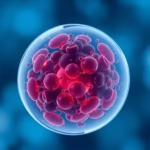Welcome to our guide on yeast infections and how vitamins can help prevent and treat them! Yeast infections are a common issue that many women face at some point in their lives. They can be uncomfortable, itchy, and downright annoying. But fear not, there are ways to combat and prevent them, and one of the key ways is through the use of vitamins.
Yeast infections are caused by an overgrowth of a type of yeast called Candida albicans. This yeast is naturally present in our bodies, but when it grows out of control, it can lead to an infection. There are several factors that can contribute to this overgrowth, such as a weakened immune system, hormonal changes, antibiotics, and even a diet high in sugar and refined carbohydrates.
Now, you may be wondering, how can vitamins help with yeast infections? Well, vitamins play a crucial role in maintaining a healthy immune system, which is essential for fighting off infections, including yeast infections. By ensuring you have the right balance of vitamins in your diet, you can help prevent yeast infections from occurring in the first place, or help treat them if you are already dealing with one.
So, which vitamins are the most important when it comes to preventing and treating yeast infections? There are several key vitamins that play a role in maintaining vaginal health and keeping Candida albicans in check. Two of the top vitamins to focus on are Vitamin C and Vitamin D.
Vitamin C is a powerful antioxidant that helps boost the immune system and fight off infections. It can help reduce inflammation and promote healthy bacteria growth in the gut, which can in turn help prevent yeast infections. Including Vitamin C-rich foods in your diet, such as citrus fruits, bell peppers, and strawberries, can be beneficial in keeping your immune system strong and your vaginal health in check.
Another important vitamin for preventing yeast infections is Vitamin D. Vitamin D is known for its role in supporting the immune system and reducing inflammation. Research has shown that Vitamin D deficiency can be linked to an increased risk of yeast infections. Getting enough sunlight exposure, eating Vitamin D-rich foods like fatty fish and egg yolks, or taking a Vitamin D supplement can help ensure you have adequate levels of this important vitamin.
Aside from Vitamin C and Vitamin D, there are other essential vitamins and minerals that can help maintain vaginal health and prevent yeast infections. By focusing on a balanced diet rich in whole foods, including plenty of fruits, vegetables, lean proteins, and whole grains, you can support your overall health and reduce your risk of experiencing yeast infections.
So, there you have it – a brief introduction to yeast infections and the role that vitamins can play in preventing and treating them. Stay tuned for the next sections where we delve deeper into the specific vitamins that can help with yeast infections. Remember, maintaining a healthy diet and lifestyle is key to keeping your immune system strong and your vaginal health in check!
What are the causes of yeast infections?
Let’s dive into the nitty-gritty of what causes those pesky yeast infections. Yeast infections are actually quite common, and they occur when there is an overgrowth of a type of yeast called Candida in the body. Normally, Candida is present in small amounts in our bodies, but certain factors can disrupt the delicate balance and lead to an overgrowth.
One of the main culprits behind yeast infections is a weakened immune system. When your immune system is compromised, it can’t effectively keep Candida in check, allowing it to grow and cause an infection. This can happen due to illnesses, stress, or taking medications like antibiotics that kill off the good bacteria in your body that help keep Candida in check.
Another common cause of yeast infections is hormonal changes. Fluctuations in hormone levels, such as those that occur during pregnancy, menstruation, or menopause, can create an environment that is conducive to yeast overgrowth. This is why many women experience yeast infections at certain times in their menstrual cycle.
Poor diet can also play a role in the development of yeast infections. Diets high in sugar and refined carbohydrates can feed the yeast in your body, leading to an overgrowth. Additionally, a lack of essential nutrients can weaken your immune system, making you more susceptible to infections.
Other factors that can contribute to yeast infections include wearing tight clothing, using scented hygiene products, and engaging in sexual activity with a partner who has a yeast infection.
So, now that you know some of the common causes of yeast infections, you can take steps to prevent them from occurring. Stay tuned to learn about how vitamins can help in preventing yeast infections!
Importance of Vitamins in Preventing Yeast Infections
Yeast infections can be a real nuisance, causing discomfort and disrupting your daily life. But did you know that vitamins play a crucial role in preventing and treating these pesky infections? That’s right! Your diet and the vitamins you consume can significantly impact your vaginal health and help keep yeast infections at bay.
Ensuring you have a well-balanced diet rich in essential vitamins is key to maintaining a healthy immune system and preventing yeast infections. Certain vitamins can help boost your body’s ability to fight off yeast overgrowth and maintain a healthy balance of bacteria in your vagina.
Top Vitamins that Can Help with Yeast Infections
There are several vitamins that are particularly beneficial for preventing yeast infections. These include Vitamin C, Vitamin D, and other essential vitamins that support your immune system and overall vaginal health.
By incorporating these vitamins into your diet, you can give your body the support it needs to ward off yeast infections and maintain a healthy vaginal environment.
Now, let’s delve into the role of two key vitamins – Vitamin C and Vitamin D – in combating yeast infections.
Vitamin C and its Role in Combating Yeast Infections
Vitamin C, also known as ascorbic acid, is a powerful antioxidant that plays a crucial role in boosting your immune system. It helps your body fight off infections, including yeast infections, by strengthening your body’s natural defense mechanisms.
Research has shown that Vitamin C can help regulate the growth of Candida albicans, the fungus responsible for most yeast infections. By maintaining optimal levels of Vitamin C in your body, you can help prevent yeast overgrowth and maintain a healthy balance of microorganisms in your vagina.
You can increase your Vitamin C intake by consuming foods rich in this essential nutrient, such as citrus fruits, strawberries, bell peppers, and leafy greens. Alternatively, you can also take Vitamin C supplements to ensure you’re getting an adequate amount of this vital vitamin.
By incorporating Vitamin C into your daily routine, you can boost your immune system and help prevent yeast infections from taking hold. So, make sure to add Vitamin C-rich foods to your diet and keep those pesky yeast infections at bay!
Top Vitamins That Can Help with Yeast Infections
Yeast infections can be a real nuisance, causing discomfort and irritation. But did you know that certain vitamins can play a key role in preventing and combating yeast infections? That’s right! By incorporating these vitamins into your daily routine, you can help keep those pesky yeast infections at bay.
Here are some of the top vitamins that can help with yeast infections:
- Vitamin B Complex: B vitamins are essential for maintaining a healthy immune system, which is crucial in fighting off yeast infections. Vitamin B6, in particular, has been shown to help regulate yeast growth and prevent infections.
- Vitamin E: Vitamin E is a powerful antioxidant that can help reduce inflammation and boost your immune system. This can be beneficial in preventing yeast infections and promoting overall vaginal health.
- Zinc: Zinc is a mineral that plays a role in immune function and wound healing. It can help strengthen the immune system and prevent yeast infections from taking hold.
By ensuring you are getting an adequate intake of these vitamins through your diet or supplementation, you can support your body in warding off yeast infections. Remember, it’s always best to consult with a healthcare professional before making any significant changes to your supplement routine.
Vitamin C and its role in combating yeast infections
Let’s talk about a powerful ally in the fight against yeast infections – Vitamin C! This essential vitamin plays a crucial role in supporting the immune system and maintaining overall vaginal health. By incorporating Vitamin C-rich foods into your diet or taking supplements, you can help prevent and combat yeast infections.
So, how exactly does Vitamin C work its magic? Well, Vitamin C is known for its antioxidant properties, which help to boost your immune system and fight off harmful bacteria and fungi, including the yeast that causes infections. By strengthening your body’s defenses, Vitamin C can help prevent yeast infections from taking hold.
Not only does Vitamin C support your immune system, but it also helps to maintain the pH balance of your vagina. A healthy vaginal pH is crucial for preventing yeast overgrowth and maintaining a healthy environment for beneficial bacteria. Vitamin C can help regulate the acidity levels in your vagina, making it less hospitable to yeast.
One of the best ways to increase your Vitamin C intake is by eating a diet rich in fruits and vegetables. Citrus fruits like oranges, grapefruits, and lemons are excellent sources of Vitamin C. Other Vitamin C-rich foods include strawberries, kiwi, bell peppers, and broccoli. By incorporating these foods into your daily meals, you can boost your Vitamin C levels and support your vaginal health.
If you’re looking to supplement your Vitamin C intake, there are plenty of options available, including Vitamin C tablets, capsules, and powders. Just be sure to consult with your healthcare provider before starting any new supplements to ensure they are safe and appropriate for you.
In addition to dietary sources and supplements, Vitamin C can also be used topically to help alleviate symptoms of yeast infections. Some women find relief by applying Vitamin C directly to the affected area in the form of a cream or gel. However, it’s essential to talk to your healthcare provider before trying any new treatment to make sure it’s safe and effective for you.
So, whether you’re looking to prevent yeast infections or manage symptoms when they occur, Vitamin C can be a valuable tool in your arsenal. By supporting your immune system, maintaining vaginal pH balance, and reducing inflammation, Vitamin C can help keep yeast infections at bay and promote overall vaginal health. Remember to prioritize a healthy diet, consult with your healthcare provider, and listen to your body’s needs to make the most of this essential vitamin!
Vitamin D and its impact on yeast infections
let’s chat about the powerhouse vitamin D and how it can play a vital role in combating those pesky yeast infections. Vitamin D is not just crucial for bone health and immune function, but it also has a significant impact on vaginal health.
Research has shown that vitamin D deficiency can lead to an imbalance in the microbiome of the vagina, making it more susceptible to infections, including yeast infections. So, ensuring you have an adequate amount of vitamin D in your system can help maintain a healthy balance of good bacteria in your vaginal flora, reducing the risk of yeast overgrowth.
One of the key ways in which vitamin D helps combat yeast infections is by boosting the immune system. A strong immune system can better fight off any harmful pathogens, including the yeast that causes infections. Vitamin D also has anti-inflammatory properties, which can help reduce the inflammation and discomfort associated with yeast infections.
So, how can you ensure you’re getting enough vitamin D to keep yeast infections at bay? The best source of vitamin D is sunlight, so try to spend some time outdoors each day to soak up those rays. You can also find vitamin D in foods like fatty fish, eggs, and fortified dairy products.
However, if you’re struggling to get enough vitamin D through sunlight and food sources alone, you may want to consider taking a vitamin D supplement. Consult with your healthcare provider to determine the right dosage for you, as excessive vitamin D intake can have adverse effects.
Remember, maintaining optimal levels of vitamin D is just one piece of the puzzle when it comes to preventing yeast infections. It’s essential to practice good hygiene, wear breathable cotton underwear, and avoid douching or using scented products in the vaginal area.
By incorporating vitamin D into your daily routine and following these tips for vaginal health, you can help keep yeast infections at bay and maintain a happy, healthy vagina. Take care of yourself, and don’t hesitate to reach out to your healthcare provider if you have any concerns or symptoms of a yeast infection. Your health and well-being are worth it!
Other Essential Vitamins for Maintaining Vaginal Health
Aside from vitamins C and D, there are several other essential vitamins that play a crucial role in maintaining vaginal health and preventing yeast infections. These vitamins are not only beneficial for overall health, but they also have a direct impact on the balance of good bacteria in the vagina, which helps to ward off infections.
Vitamin E
Vitamin E is known for its antioxidant properties, which help to neutralize harmful free radicals in the body. In terms of vaginal health, vitamin E can help to reduce inflammation and support the immune system, which is essential for fighting off infections. You can find vitamin E in foods like nuts, seeds, and leafy greens.
Vitamin A
Vitamin A is essential for maintaining healthy skin and mucous membranes, including those in the vagina. It helps to support the immune system and promote the growth of healthy bacteria, which can help prevent yeast infections. Foods rich in vitamin A include sweet potatoes, carrots, and spinach.
Vitamin B Complex
The B vitamins, including B1, B2, B3, B5, B6, B7, B9, and B12, are crucial for overall health and wellbeing. They play a role in supporting the immune system, regulating hormone levels, and promoting healthy digestion – all of which are important for preventing yeast infections. You can get B vitamins from a variety of foods, including whole grains, meat, fish, and leafy greens.
Zinc
Zinc is a mineral that is essential for the immune system and plays a key role in wound healing and tissue repair. It also helps to maintain healthy mucous membranes, including those in the vagina. Zinc can be found in foods like oysters, red meat, and poultry.
Probiotics
While not a vitamin, probiotics are essential for maintaining vaginal health and preventing yeast infections. Probiotics are beneficial bacteria that help to balance the microflora in the vagina, which can help to prevent the overgrowth of yeast. You can find probiotics in fermented foods like yogurt, kefir, and sauerkraut, as well as in supplement form.
It’s important to note that while vitamins and minerals play a crucial role in maintaining vaginal health, they are not a substitute for proper hygiene practices and medical treatment when necessary. If you are experiencing recurrent yeast infections or other vaginal issues, it’s important to consult with a healthcare provider for proper diagnosis and treatment.
By incorporating these essential vitamins and minerals into your diet, along with practicing good hygiene and seeking medical advice when needed, you can help to maintain a healthy balance in your vaginal flora and reduce your risk of yeast infections.
Further Reading







